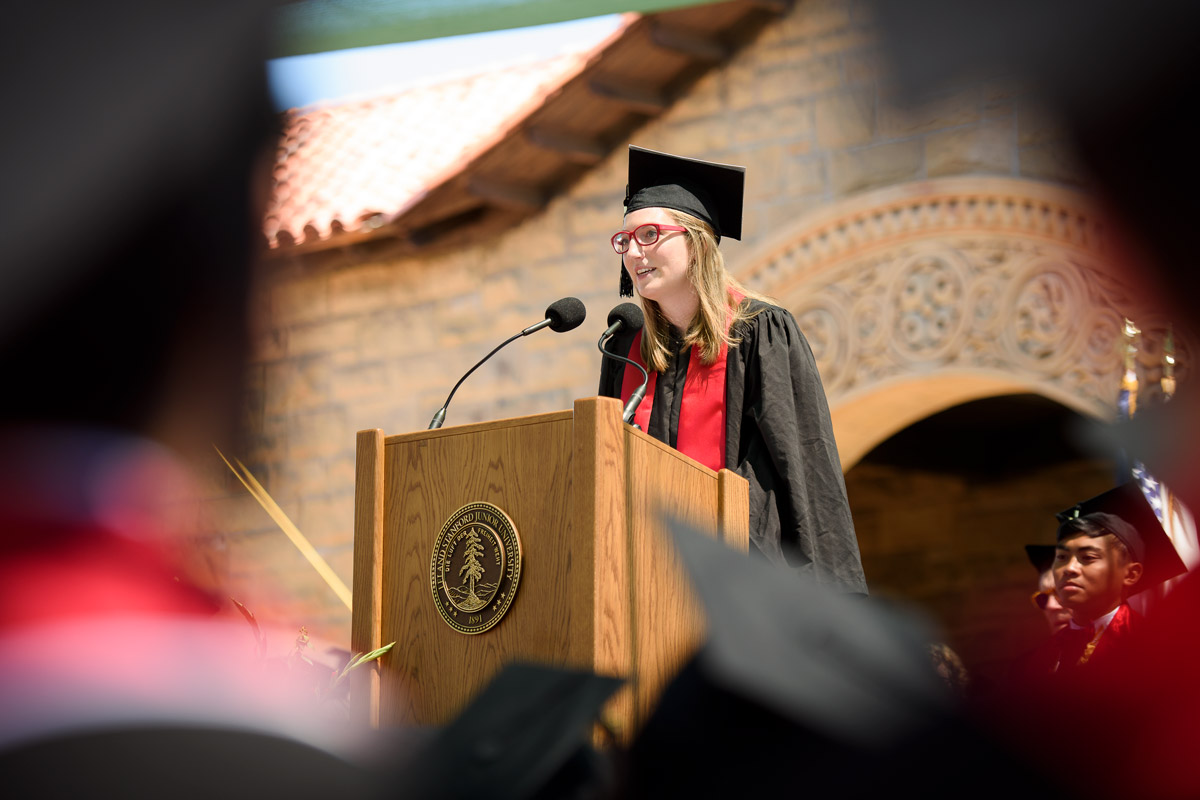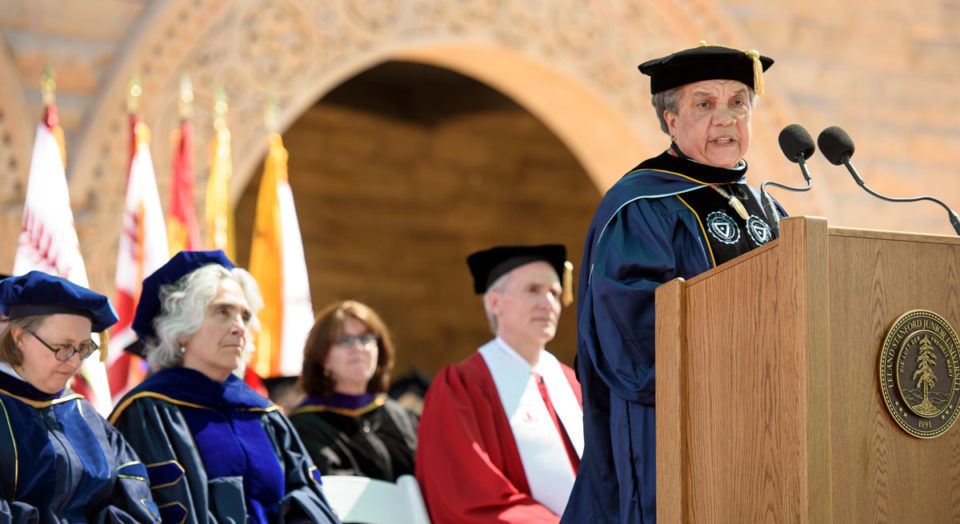Child rights advocate and activist urges Stanford graduates to give back, fight injustice
Baccalaureate speaker Marian Wright Edelman told graduates to recognize the support and love they have received throughout their life and use their talents and skills to shape a better future for the disadvantaged in the U.S. and the rest of the world.
Go to the web site to view the video.
Civil rights activist and humanitarian Marian Wright Edelman encouraged Stanford graduates to give back as they enter the workplace and focus on making the world and the United States more just and fair.
“I hope many of you will wander off the beaten career path and help redefine success in 21st-century America, asking not ‘How much can I get?’ but ‘How much can I do without and share?’” Edelman said.
Edelman gave her speech to a crowd of nearly 4,000 people, including about 850 graduates, on Saturday morning in the Main Quad during Baccalaureate, a multifaith, spiritual celebration for students and their families and friends.
‘Moment of extraordinary opportunity’
Edelman, who is founder and president of the Children’s Defense Fund, has dedicated her career to helping others and pushing boundaries while doing it. A graduate of Spelman College in Atlanta and Yale Law School, she was the first black woman admitted to the Mississippi Bar, and she started her work under the leadership of Martin Luther King Jr. during the civil rights movement in the 1960s.
She went on to direct the NAACP Legal Defense and Educational Fund office in Jackson, Mississippi. Her advocacy achievements have earned her honorary degrees and awards, including the Albert Schweitzer Prize for Humanitarianism, the Heinz Award and the Presidential Medal of Freedom.
Help redefine success in 21st-century America, asking not ‘How much can I get?’ but ‘How much can I do without and share?’
—Marian Wright Edelman
Edelman said she felt lucky to be born during the time she described as “the intersection of great events and great leaders.” She invoked the legacy of several civil rights champions, including King and Harriet Tubman, and she quoted from speeches of Robert F. Kennedy and one of her mentors, the Rev. Dr. Samuel DeWitt Proctor, a civil rights activist, minister and educator.
“He said: ‘We do not all start at the same scratch line,’” Edelman said, citing a sermon of Proctor’s from 1994. “‘Those of us who have inherited benefits that we did not earn or deserve need to turn around and help those who inherited deficits that they did not earn or deserve and help them to rise up to the scratch line where we are.’”
Addressing the current political landscape in the United States, Edelman implored students to protect and build on the civil rights strides of the past.
“You happen to be born at the moment of extraordinary opportunity when everybody is trying to take away the last 50 years of progress,” Edelman said. “And I’ll just tell you, this one grandma, we ain’t going backward, we’re gonna have to go forward.”
In particular, Edelman encouraged the Class of 2017 to turn their attention to the existing inequalities in communities across the United States. She urged students to get involved and help end the child poverty, violence and illiteracy that threatens the future of the country.
Edelman especially emphasized the need to protect children, citing a statistic that says states are spending on average three-and-a-half times more per prisoner than per public school student.
As students leave the nurturing halls of Stanford, Edelman also urged them to not be afraid of criticism they may get when they stand up for the rights of others.
“If you don’t want to be criticized, don’t say anything, don’t do anything, and don’t be anything,” Edelman said.
Learning to ask for help along the way
Senior Emma Coleman, the 2017 Baccalaureate student speaker, took the stage after Edelman. Coleman, who is from Chicago, will receive her bachelor’s degree in international relations and comparative studies in race and ethnicity. During her time at Stanford, Coleman has served on the 2017 Class Cabinet and was also the mental health and well-being co-chair of the Executive Cabinet of the Associated Students of Stanford University.
In her speech, which was selected from among 36 submissions, Coleman encouraged her classmates not to be afraid to ask for help when they need it. Coleman said she learned that lesson her junior year when a tackle during a rugby game landed her in the emergency room and led to surgery and a year-long recovery.

In her student reflection, Emma Coleman told her classmates to see asking for help not as an admission of weakness but as a sign of strength. (Image credit: L.A. Cicero)
Coleman said she was afraid to ask for help because she thought it would be an admission of weakness. But when she did finally ask for that help, Coleman said she was met with an outpouring of love and support from the Stanford community.
“Often, we are encouraged to fight our battles alone, because we believe that is what success and strength look like,” Coleman said. “It is in the entrepreneurial spirit of Stanford to recognize independent champions. But behind each one of us are hundreds of people who have helped along our paths.”
The year after her injury opened Coleman’s eyes to the small acts of kindness she encountered on her Stanford journey. She remembered her freshman roommate who stayed up until 3 a.m. to help her with problem sets and the teaching assistant who wrote her a recommendation despite a tight deadline.
“I found a community that was generous in the extreme, who wanted to lift me and help me stand on my own feet again,” Coleman said. “These acts of kindness from friends and strangers are what shaped our Stanford experience into what it was – and shaped us into who we are now.”
Coleman asked her classmates to also reflect and thank those who have helped them rise to where they are.
“Going out in the world, we must be courageous, and see asking for help not as an admission of weakness, but a testament to our strength,” Coleman said. “We must ask for help when we need it, and offer it generously when we are able.”

